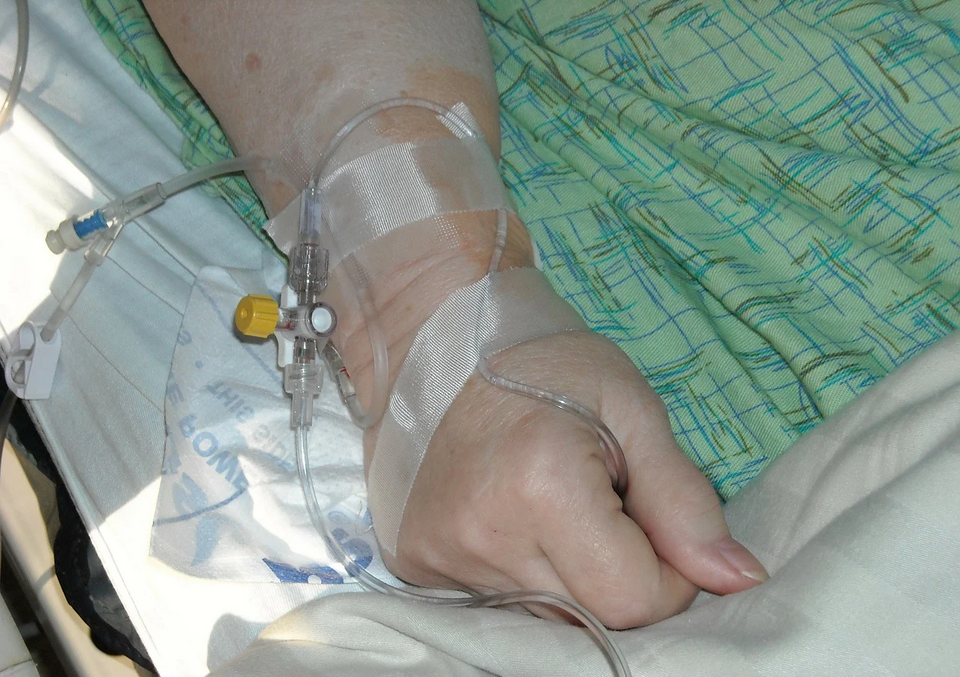COVID-19: UVA Doctor says Clinical Trial with Remdesivir Shows Promise
Remdesivir is an antiviral drug which is administered intravenously. (Image from Pixabay)
CHARLOTTESVILLE, VA.– Is a cure on the horizon for patients suffering the worst effects of COVID-19? It may be, according to a new study which was announced earlier today by health professionals at the University of Virginia (UVA).
UVA, working in conjunction with the National Institutes of Health (NIH), reports that the antiviral drug Remdesivir – tested against COVID-19 at UVA Health and other sites – helped patients with advanced cases of the disease recover 31% faster than patients who received a placebo. The drug also appeared to improve survival in affected patients.
Trial-wide, the median recovery time for patients who received Remdesivir was 11 days, compared with 15 days for those who received placebo, according to preliminary data released by the NIH. In terms of mortality, 11.6% of placebo recipients died, compared with only 8% of remdesivir recipients.
Remdesivir is an investigational nucleotide analog with broad-spectrum antiviral activity. Developed by California-based Gilead Sciences, Inc., Remdesivir is not currently approved anywhere globally for any use, and does not have established safety or efficacy for the treatment of any condition. Remdesivir has demonstrated in vitro and in vivo activity in animal models against the viral pathogens MERS and SARS, which are also coronaviruses and are structurally similar to COVID-19. The limited preclinical data on Remdesivir in MERS and SARS indicate that Remdesivir may have potential activity against COVID-19.
To understand the hopeful news which emerged from the Remdesivir trial, we spoke with Dr. Taison D. Bell. Bell is an assistant professor of medicine in the divisions of Infectious Diseases and International Health and Pulmonary and Critical Care Medicine at UVA. He is also the Director of the medical intensive care unit (ICU) and director of the UVA Summer Medical Leadership Program.
BPE: Please tell us how UVA came to be involved in this study?
Dr. Bell: We were one of the many sites around the country that wanted to take part in a clinical trial of Remdesivir. These were all offered through Gilead. There were two at the time that were run through Gilead and an NIH trial where Gilead was supplying the drug. So, when we looked at the different trials that were available, this one seemed the most attractive to us, because in our opinion, it was a high-quality randomized control trial that would really give us an answer as to whether this would be an effective therapy or not.
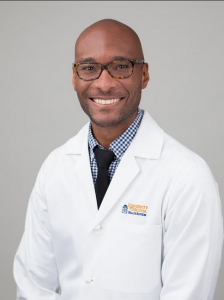
(courtesy UVA Health)
We were able to convince the NIH’s Dr. John Biegel – who I had worked with, when I was a fellow at the NIH – that we were a good site. We already had a research staff up and running. We had a separate Covid treatment team. And we had a few cases, but we weren’t overwhelmed with cases to the point that we wouldn’t be able to do the rigorous work that a clinical trial requires. We were able to get in on the trial that we wanted, and we were very happy to.
BPE: You said that, at the time the trial began, you weren’t overwhelmed with Covid patients. What kind of numbers are you seeing right now at the hospital?
Dr. Bell: I’m not at liberty to release specific numbers, but I will say that we do have multiple patients. But we haven’t seen the surge that we were prepared for. That’s certainly been good news across the Commonwealth.
BPE: And you are part of a 67-hospital-strong, world-wide study?
Dr. Bell: That’s right.
BPE: Were you familiar with Remdesivir prior to the initiation of this study?
Dr. Bell: I was, because this was studied in the Ebola crisis a few years ago. It was studied then in combination with a couple of other agents, and it showed that it didn’t perform as well as some of those other agents. But it did have some efficacy, meaning that it did have a plausible mechanism that worked, and we hoped that it could work for this.
BPE: Can you tell us the age range of the patients studied and if/how age or preexisting conditions factor into the recovery rate?
Dr. Bell: Across the country, we’re seeing different ages of people infected with Covid. I think the earlier message on Covid is that it was more of a serious disease in the elderly population. But there are plenty of younger people who are ending up sick with Covid disease as well.
We have also seen that people with chronic conditions – such as high blood pressure, diabetes, heart disease – have more serious outcomes, and especially fatal outcomes, with Covid disease. When they get infected, they have much more severe disease compared to others.
BPE: Please explain a bit about how this trial was conducted.
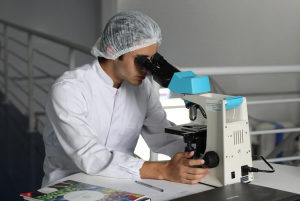
DR. Bell: We were blinded to the patients on the trial, meaning that the treatment team and the research team were not aware of the different assignments; whether a patient got Remdesivir or a patient got placebo. We weren’t able to tell that difference; only the research pharmacist at the UVA hospital knew the assignment, and they didn’t disclose that to us.
So, we weren’t able to tell if it was working or not. I think that was important to preserve integrity and not have bias introduced into the study. Because once we know what assignment a patient has, that colors the rest of our thinking about their clinical results.
BPE: Were patients (or their guardians) coming into the hospital able to make an informed decision whether or not they wanted to participate in the study?
Dr. Bell: The consent process had to be really re-imagined, because there were a lot of concerns about infection control and spread. If a patient was able to consent on their own, meaning they were able to talk with us and explain that they understood the risk and the benefits, then we were able to do it in a standard way. Normally, when we consent someone for a study, they sign a piece of paper, we take that paper back to our research offices, and file it. That’s obviously not what you want to do, if someone you are talking to has Covid disease, and you’re going to have to touch something that you are going to bring back to the office. So, we actually had to use Telehealth Solutions, where we were teleconferencing in, and we got flexibility from our institutional review board, and we were able to use that solution so that we could minimize the spread of Covid disease, while still being able to consent the patient.
If they were not able to speak on their own or were unconscious, then we were able to reach out to surrogates to consent for them.
BPE: When you do a study like this, if the patient is cognizant of the process, they know that they’re either going to be getting this exploratory drug or a placebo. How do you think that factors into the mindset of a patient who is participating in a trial?
Dr. Bell: The concept of a placebo is a difficult one to explain. The patients sometimes will ask the question, ‘If you think this may work, why wouldn’t you just give me the drug and see if it works?’ I think the important thing to get across is that we try experimental therapies because we think that they may have a benefit, but they also have side effects.
Sometimes those side effects can be fatal or pretty bad.
We saw that with Hydroxychloroquine, which increases the rate of abnormal heart rhythm and can lead to death in a small amount of people. That’s a real side effect.
The only way that you can really study in a balanced way to see the effect of a drug versus the potential toxicity is if you look at a placebo. There have been plenty of trials where we have looked at investigational agents that turned out to do more harm than good. If you were in that trial, you would have actually been better off if you had been in the placebo arm.
Because we don’t know how things will shake out, even if we have an idea, the best way that we can protect the population in general is to do a trial; to have a control arm and a placebo. That way, we can know the benefit of the drug, and we can understand the side effect profile as well.
BPE: You mentioned the study surrounding Ebola, which of course primarily affected West Africa. How is it for you, as a doctor, to be able to participate in a study against a pandemic that is actually affecting the general population here versus reading about something that was studied overseas?
Dr. Bell: The first thing I would say is that I feel like we really needed a win and a positive story out of this. It feels like, since Covid started, we’ve just been taking one hit after another, whether it’s from the disease itself spreading in the U.S., the hit on the economy and the discussion about when we can open up; it’s all been kind of negative news. But this is the first real positive step towards a therapy that we can say we can demonstrate that this can work. More importantly than the effect itself is the concept that this is possible; we can do this. That’s going to open up the floodgates for more research trials and more investigational agents, because we have demonstrated that we can target this virus and actually make a positive benefit for patients.
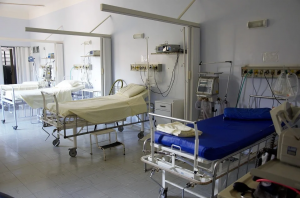
BPE: You were looking at patients who were already in intensive care. Is there anything about this drug which might be helpful to patients at an earlier point in the infection?
Dr. Bell: They weren’t necessarily in intensive care. We did have patients who were in the regular part of the hospital. The enrollment criteria were that they had confirmed Covid disease and they had severe manifestation. That could mean oxygen requirement or that your imaging indicated that you had severe disease. Some of these patients were actually on oxygen but not to the level that we would need to go to the ICU.
The important thing to remember is that we want to use drugs in the context of how they were studied. Does that mean we should give Remdesivir to everyone who has Covid? The answer is ‘No’, because we use it in an exclusive population of people who are in the hospital, and it’s intravenous medication, not a pill. In the context of what we’ve learned with these patients – who have severe disease and who are in the hospital and need oxygen or have imaging – is this is a beneficial drug. Does that mean that it’s beneficial for anyone with Covid, even if they don’t have oxygen requirements or not in the hospital? I can’t answer that question. That would have to be a separate study. But what we know is that, for people who have severe disease, this medicine has a positive effect in lowering your time in recovery.
BPE: Is this a drug which is readily available now, or is Gilead in the process of ramping up production?
Dr. Bell: The first step is that the FDA has to issue emergency authorization, which I believe they were working on last evening. And then, Gilead has to work on scaling this up and making sure they have good distribution, so we can get it to patients across the globe. They have indicated that they anticipated this, and they are working on it, so I think, as quickly as humanly possible, they will be able to get this out to patients.
BPE: I understand that more studies are on the way, comparing Remdesivir against baricitinib. I’m sorry if I’m mispronouncing these words.
Dr. Bell: No need to apologize. It’s like an alphabet soup; it’s getting ridiculous. Doctors feel that way too. Hopefully, the trials will begin as soon as possible.
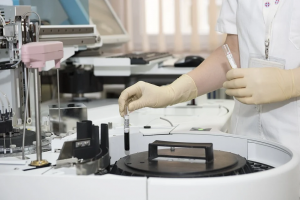
This trial was an adaptive trial, meaning that it can change as the landscape of treatment changes. The trial was set up initially to do a four-way comparison between Remdesivir and baricitinib, and it was still going to include a placebo group, because we didn’t have these results available. But now that the Remdesivir results are available, that essentially is going to become the new standard of care, meaning that every patient will get Remdesivir and we’ll compare that to Remdesivir alone or getting Remdesivir plus baricitinib. That means that it has to go through the institutional review boards, to make sure that those changes are updated. That will take a little bit of time, but hopefully, not too much longer. We’re hopeful that we’ll be able to start enrolling patients by the earliest, next week.
BPE: Is baricitinib currently being studied at UVA or elsewhere separately?
Dr. Bell: Not in the context of Covid disease. Baricitinib is a drug that was approved for rheumatoid arthritis, an inflammatory condition, but I’m not currently aware of a trial that is looking at this right now in the context of Covid.
BPE: I don’t want to go too far afield here, but could you comment on how herd immunity may or may not factor into beating Covid -19?
Dr. Bell: The herd immunity is a concept that, when a lot of people in a group either have the infection or they are vaccinated, you can protect some of the people who don’t have that protection coming in. This was explained in the context of measles, which is a really infectious agent. But because we can aggressively vaccinate against it, if there is the occasional person who can’t receive the vaccine – hopefully, in my opinion, because they can’t receive it – then they receive protection, because there won’t be people around them who get infected.
We certainly have hope that herd immunity will be something that is beneficial and that would help lower the impact of a second or third wave in the Fall.
But it requires a few things.
It requires that people who get infected actually have enough immunity to prevent the spread themselves, and for getting reinfected. And we’re not sure how robust the immune response is and how long that protection lasts. Then you really have to have a high proportion of the population either infected or vaccinated, and we’re not sure (of those numbers) at this point because our testing has been limited to how prevalent this has been in the country.

If we had, say 85 or 90% of people getting infected with this, then there is a good chance that there won’t be many more infections to be had.
If it’s much lower than that, then we have to bridge that gap with a vaccine, once that becomes available. Then we can say that this will become less of a problem, when we are opening up schools and the economy again.
I think it’s too early for us to really know, and that’s why it’s so important to have a robust testing infrastructure in place, so that if people do get symptoms, we can quickly test and isolate them and do contract tracings, so we can prevent the further spread.
BPE: From a purely personal standpoint, how do you feel about knowing you are giving the most severely stricken patients a fighting chance?
Dr. Bell: It feels really good. A lot of treating Covid disease feels like you’re in a black box, like you’re isolated and you’re not exactly sure what you’re supposed to be doing. This is an instance where we can say there’s something that we can offer that we feel fairly confident that it can make you better. To have finally a story of hope for patients and for physicians lifts the spirit a little bit. Even though we’re dealing with something that’s affecting millions of people – many have died, our economy is in a shambles right now essentially – but we do have this, and that matters.
To be able to feel like you can do something that matters and that UVA contributed to discovering that is a moment in history that we’ll never forget. To be a part of that – and to share that with our research team and our other scientists here and pharmacists, and everyone who really pulled this together to make us a site – is a really big deal for us. It can’t be underestimated.

Anthony C. Hayes is an actor, author, raconteur, rapscallion and bon vivant. A one-time newsboy for the Evening Sun and professional presence at the Washington Herald, Tony’s poetry, photography, humor, and prose have also been featured in Smile, Hon, You’re in Baltimore!, Destination Maryland, Magic Octopus Magazine, Los Angeles Post-Examiner, Voice of Baltimore, SmartCEO, Alvarez Fiction, and Tales of Blood and Roses. If you notice that his work has been purloined, please let him know. As the Good Book says, “Thou shalt not steal.”

